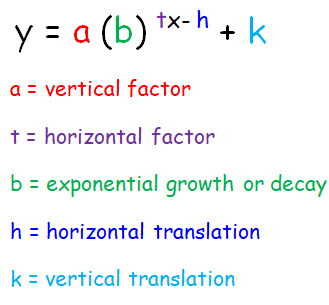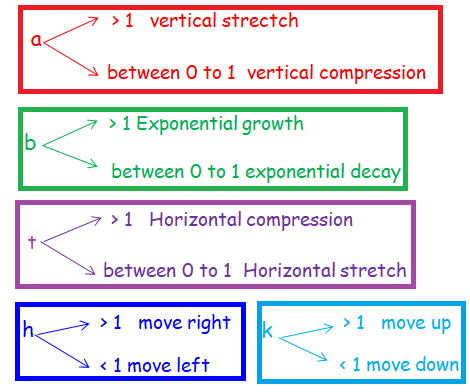DESCRIBING THE TRANSFORMATION OF A EXPONENTIAL FUNCTION
Subscribe to our ▶️ YouTube channel 🔴 for the latest videos, updates, and tips.


Describe the transformation that map the function y = 2x on each of the following functions.
Problem 1 :
y = 2x - 2
Solution :
Comparing the given with the standard form of exponential function
y = a (b)x - h + k
a = 1, b = 2, h = 0 and k = -2
The value of k tells us about the vertical translation. Here the value of k is -2 < 0, so we have to move the curve down 2 units.
Required transformation is,
shifting 2 units down
Problem 2 :
y = 2x+3
Solution :
Comparing the given with the standard form of exponential function
y = a (b)x - h + k
y = 2x - (-3)
a = 1, b = 2, h = -3 and k = 0
The value of k tells us about the horizontal translation. Here the value of h is -3 < 0, so we have to move the curve left 3 units.
Required transformation is,
shifting 3 units left
Problem 3 :
y = 4x
Solution :
The given function is not in terms of the parent function.
y = (22)x
The value of x is being multiplied by 2, so it should be horizontal stretch or compression.
Considering the value of a = 2 > 1, this should be horizontal compression.
Required transformation is,
horizontal compression by the factor of 2.
Problem 4 :
y = 3(2x - 1) + 1
Solution :
Comparing the given with the standard form of exponential function
y = a (b)x - h + k
a = 3, b = 2, h = 1 and k = 1
Transformations should be done in the following order.
1) compression or stretches
2) Reflection
3) translation
So, the required transformations are,
a = 3 >1, so vertical stretch with the factor of 3.
No reflection
Translation of 1 unit right and 1 unit up.
Describe the transformation that map into the function
y = 8x
on to each function.
Problem 5 :
y = (1/2) 8x
Solution :
Comparing the given with the standard form of exponential function
y = a (b)x - h + k
a = 1/2
comparing with the parent function, the value of b is the same and no translation.
The value of a tells us the vertical stretch or compressions.
Considering the value of a = 1/2 ==> 0 < b < 1
So, the required transformation is,
vertical compression by the factor of 1/2.
Problem 6 :
y = -8x
Solution :
y is changed as -y, so reflection across x-axis.
So, the required transformation is,
reflection across x-axis.
Problem 7 :
y = 8-2x
Solution :
Scale factor is 2, horizontal compression with the factor of 2.
x is changed as -x, so reflection across y-axis.
So, the required transformation is,
horizontal compression with reflection across y-axis.
Using the parent graph of f(x) = 4x, describe the transformation of each function.
Problem 8 :
f(x) = -2(4x + 3) - 5
Solution :
f(x) = -2(4x - (-3)) - 5
Here, a = -2, b = 4 (same), h = -3 and k = -5
Vertical stretch with the factor with the of 2 along with reflection across x-axis.
Horizontal translation of 3 units left and vertical translation of 5 units down.
So, the required transformations are,
Vertical stretch of factor 2 ==> reflection across x-axis => move left 3 units and down 5 units.
Problem 9 :
f(x) = (42x + 6) + 2
Solution :
f(x) = (42x - (-6)) + 2
Here, a = 1, b = 4 (same), h = -6 and k = 2
So, the required transformations are,
Horizontal compression of 2 units. No reflection. Move horizontally 6 units left and 2 unit up.
Problem 10 :
f(x) = (4-3x + 12) + 1
Solution :
f(x) = (4-3x - (-12)) + 1
Here, a = 1, b = 4 (same), h = -12 and k = 1
So, the required transformations are,
horizontal factor of 3, 3 > 1
Horizontal compression of 3 units. Reflection across y-axis. Move horizontally 12 units left and 1 unit up.
Problem 11 :
f(x) = (4(1/2)x - 2) + 3
Solution :
f(x) = (4(1/2)x - 2) + 3
Here, a = 1, b = 4 (same), h = 2 and k = 3
So, the required transformations are,
horizontal factor of 1/2, 0 < HF < 1
Horizontal stretch of 1/2 units. No reflection. Move horizontally 2 units right and 3 units up.
Problem 12 :
f(x) = (1/3)(4(1/3)x + 3) - 4
Solution :
f(x) = (1/3)(4(1/3)x + 3) - 4
Here, a = 1/3, b = 4 (same), h = -3 and k = -4
So, the required transformations are,
horizontal factor of 1/3, 0 < HF < 1
Horizontal stretch of 1/3 units. No reflection. Move horizontally 3 units left and 4 units down.
Subscribe to our ▶️ YouTube channel 🔴 for the latest videos, updates, and tips.
Recent Articles
-
Finding Range of Values Inequality Problems
May 21, 24 08:51 PM
Finding Range of Values Inequality Problems -
Solving Two Step Inequality Word Problems
May 21, 24 08:51 AM
Solving Two Step Inequality Word Problems -
Exponential Function Context and Data Modeling
May 20, 24 10:45 PM
Exponential Function Context and Data Modeling